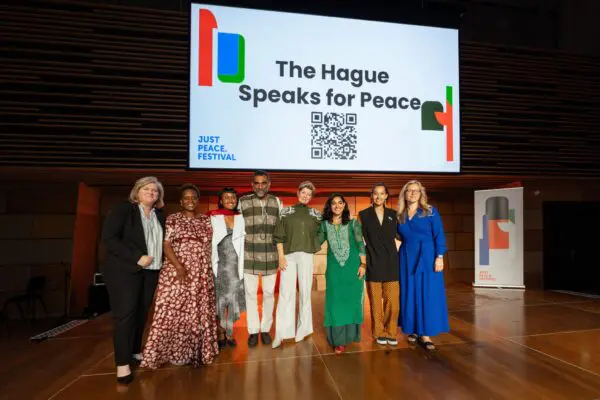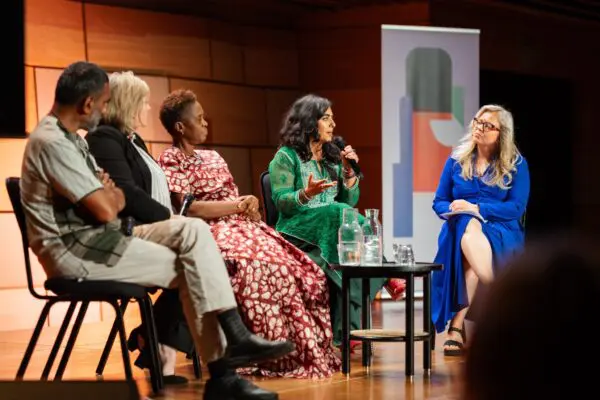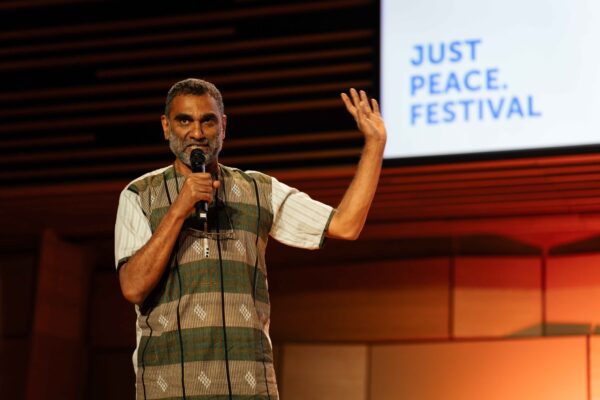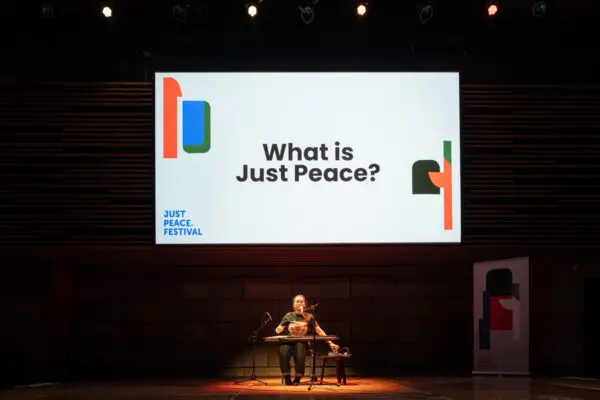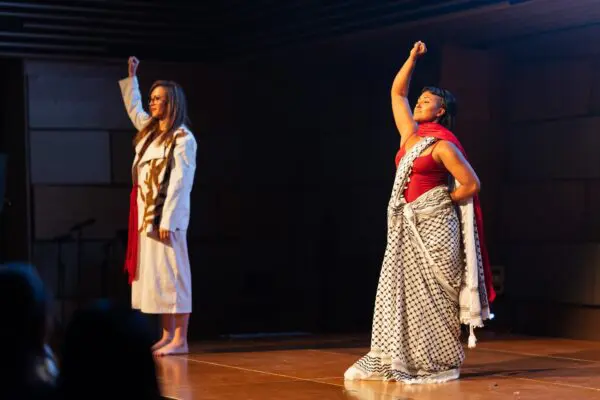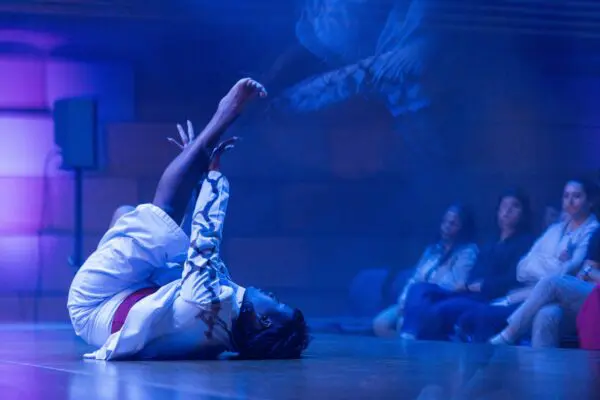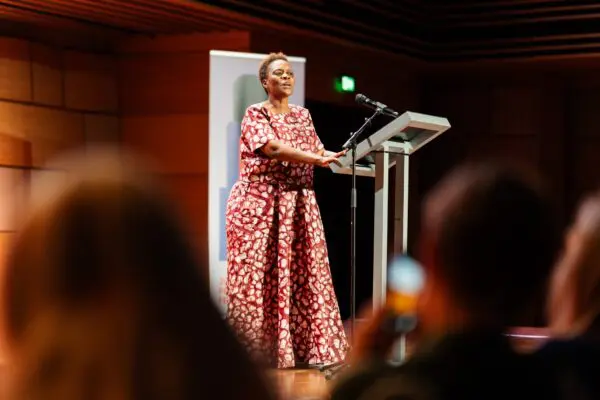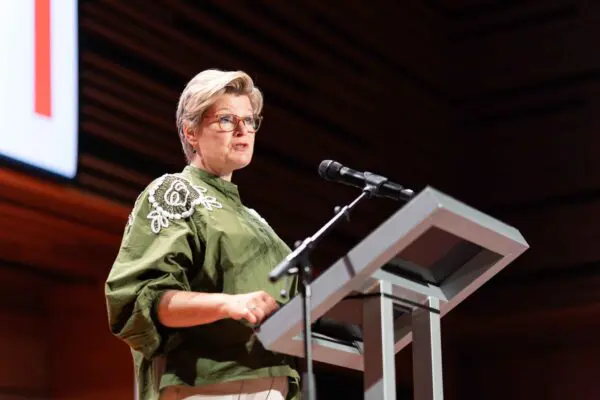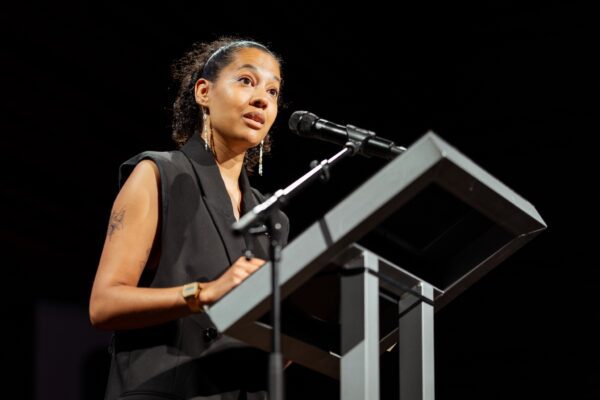On the evening of June 23, just two kilometers from where NATO delegates were about to gather to finalise their security agenda behind closed doors, a very different kind of summit took place. At Amare Studio, in the heart of The Hague, over 250 people came together for something radically human: an evening of words, music, movement, and dialogue.
Hague Talks: What Is Just Peace? was the highlight event of this year’s Just Peace Festival, co-organised by The Hague Humanity Hub, the Municipality of The Hague, and Leiden University. It brought together artists, activists, policymakers, and citizens to reflect on alternative pathways to peace in a world engulfed in crisis.
This was not a night of diplomatic declarations or polished panels. It was an invocation, a collective breath, a space for reckoning with our global condition, and first and foremost: a space for imagining otherwise.
Stories that refuse silence
Poet and performer Nicchelle Buyne opened the evening with a searing spoken word piece on death, dignity, and structural violence. Her words moved through grief, rage, and resilience; referencing police brutality, drone warfare, poisoned water, femicide, and colonial violence.
It was not a morbid poem. It was a radical articulation of what justice might look like if we centered on the most vulnerable.
“I hope when you die, it’s not with someone’s knees on your neck while the world watches you on a livestream”
Leila Prjnavorac, moderator and peace ambassador, then welcomed the audience into the evening. Her own story of surviving war and finding refuge in the Netherlands set the tone: peace is not a lofty abstraction, it is lived, fought for, and always fragile.
“There is nothing else we need to fight for than peace”, she told us. “And never again is today”
Naming the forces that endanger peace
In her opening address, Deputy Mayor Mariëlle Vavier reminded us that true security cannot be found in weapons or surveillance, but in justice, inclusion, and resilience. She shared her pride in the Just Peace Festival’s 60+ events across the city and emphasised the role of municipalities in fostering inclusive, resilient societies.
Sahar Shirzad, legal professional and founder of Refugee Millennials, delivered one of the evening’s most powerful speeches. She did not speak about war. She spoke from within its aftershocks; as someone shaped by forced displacement, by asylum systems that strip people of agency and dignity, by the long inheritance of injustice.
“Do we ever get a seat at the table when you talk about peace?”
Her speech carried the voice of generations displaced by war and denied dignity by asylum systems. She reminded us that compassion is not a luxury but a necessity. And that the children of war do not need charity, but solidarity and justice.
“Fear feeds our reptile brain. But compassion rewires us for connection.”
“Peace is not epic. It is a woman cycling home in Kabul, free.”
Sahar called for a shift from performative policy to transformative solidarity and her words echoed long after she left the stage.
From Sierra Leone, Rugiatu Neneh Turay-Koroma shared her deeply rooted, community-driven work to end female genital mutilation. She offered a vision of change not imposed by outsiders, but cultivated from within: grounded in cultural sensitivity, grassroots dialogue and long-term trustbuilding.
“Remove your knee from our necks”
“Peace cannot be imposed. It must be nurtured. It must come from within.”
Through her Neneh Strategy and the Rothumba Project, she reminded us that peace is not policy alone: it is access to dignity, health, culture, and education. Her work shows how locally owned, culturally rooted approaches can disrupt cycles of harm and lay foundations for lasting peace.
Culture as the heartbeat of resistance
If the evening made one thing clear, it is that activism without culture is brittle. Art is not decoration; it is how we survive, remember, and resist.
Ruby Joemai (member of the decolonial artist collective CTRL+ALT+IDENTITY and working under the name Kaam Kari La) and Josefien van Marlen performed a haunting, bodily reflection on identity and history that blended movement, sound, and symbolism. A bodily archive unfolding in real time.
Later, Syrian-Dutch fusion artist Shaza Manla brought Syrian soul, jazz, and hip hop into a cinematic soundscape that left the audience stunned. Her music reminded us that cultural expression itself is a form of resistance.
“Art keeps the soft powers alive in our hearts”, Sahar said later. “It allows us to imagine otherwise.”
These artists did not perform between the talks, they spoke their own language. With their own cadence, they carried the same weight and urgency. They reminded us: peace must also be felt to be real.
A world on fire
Jess O’Connell, co-founder of the Democracy Security Project, spoke with the clarity and urgency of someone who has seen democratic institutions unravel. She named the escalating threats in the United States – political violence, propaganda, and authoritarianism – and urged us not to look away.
“Peace requires participation. And there is no excuse not to act.”
Jess made it clear that democracy cannot be taken for granted. From the storming of the Capitol to the silencing of marginalised voices, she outlined a global trend where backlash and extremism thrive in silence and apathy. She urged those with relative privilege to take up space in the struggle for justice, rather than outsource it to those already most impacted.
She spoke not just of politics, but of power: who holds it, who fears losing it, and what happens when we don’t challenge it.
Kumi Naidoo, veteran activist and former Secretary-General of Amnesty International and Executive Director of Greenpeace, closed the evening with a powerful mix of truth-telling, vulnerability, and unexpected humor. He spoke not from a podium of authority, but from a place of deep weariness and enduring hope.
He spoke of climate collapse, the military-industrial complex, and the co-optation of political systems by fossil fuel giants. He drew connections between militarism, colonial legacies, and environmental injustice, insisting that these are not separate issues, but symptoms of the same crisis of imagination and power.
“Pessimism is a luxury we cannot afford”
He called for a turn toward arts, towards culture, but not as escapism: but as the beating heart of resistance.
“Mobilising the power of arts and culture alone won’t save us. But ignoring it guarantees we will fail.”
He ended not with a final warning, but with a plea: to show up for the world as it could be, not just as it is.
Reflection dialogue
The evening concluded with a shared reflection, a chance for the speakers to respond to one another, and to consider together what a Just Peace might mean in practice. Together, they exchanged thoughts not only on the ideas shared throughout the evening, but on their implications: the responsibilities they carry, the weight of lived experience, and the role of those with power and platform.
What emerged in this final exchange was a deeper grounding of the evening’s themes: that peace is relational and ongoing, that it cannot be separated from justice, and that it begins with showing up: to listen, to act, and to stand alongside others, especially when the stakes are high.
Where do we go from here?
We thank all who made this evening possible: our speakers, our artists, our volunteers, our partners at the Municipality of The Hague and Leiden University, and the tireless team at The Hague Humanity Hub.
We thank Holland Park Media for their audio-visual support, Interprefy for making Dutch interpretation available, and Amare for being our venue partner.
We invite you to keep walking, speaking, creating, and organising.
Follow The Hague Humanity Hub and Just Peace. Share what moved you. Rewatch the talks. Support the speakers. Read their work. Invite others into the conversation.
“Be a minister of peace. Let the gentle forces win.”
